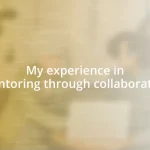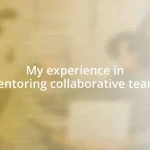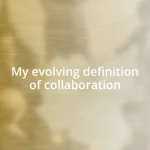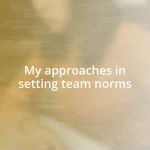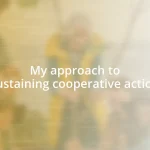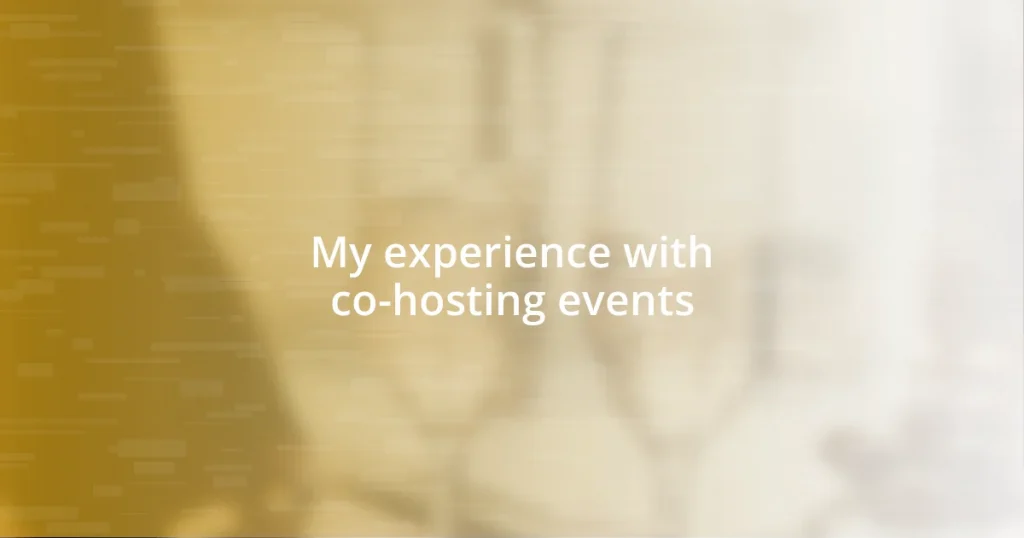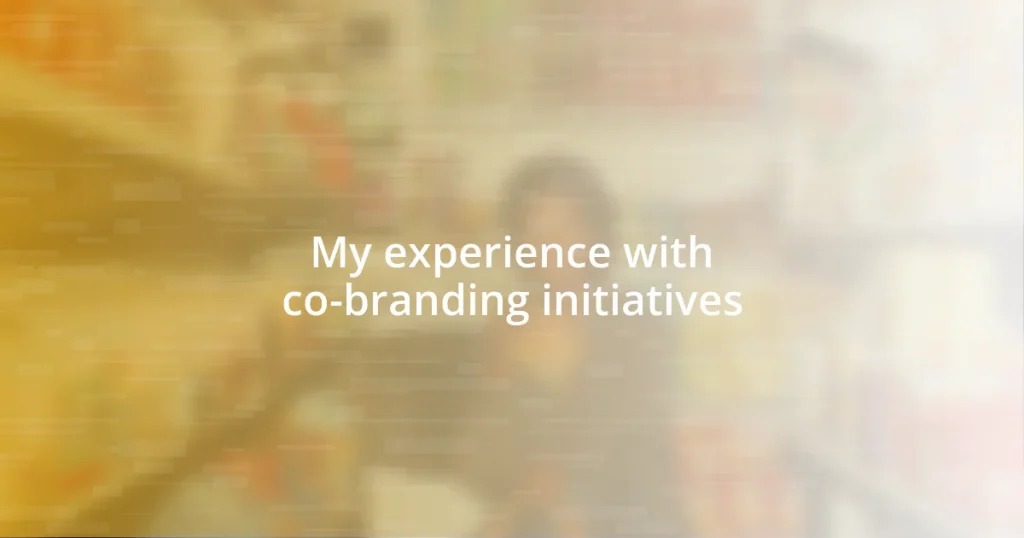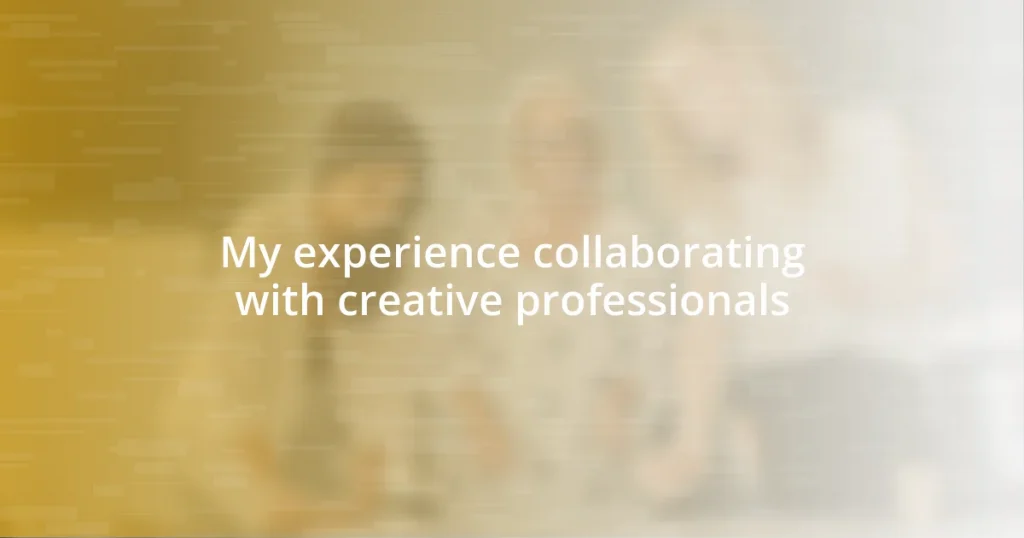Key takeaways:
- Co-hosting enhances event experiences through effective communication, adaptability, and synergy between partners, allowing for seamless event management.
- Shared responsibilities in co-hosting streamline planning, expand reach, and foster creativity, leading to more engaging and successful events.
- Post-event evaluations and attendee feedback are crucial for continuous improvement, helping to refine future events and strengthen relationships with participants.
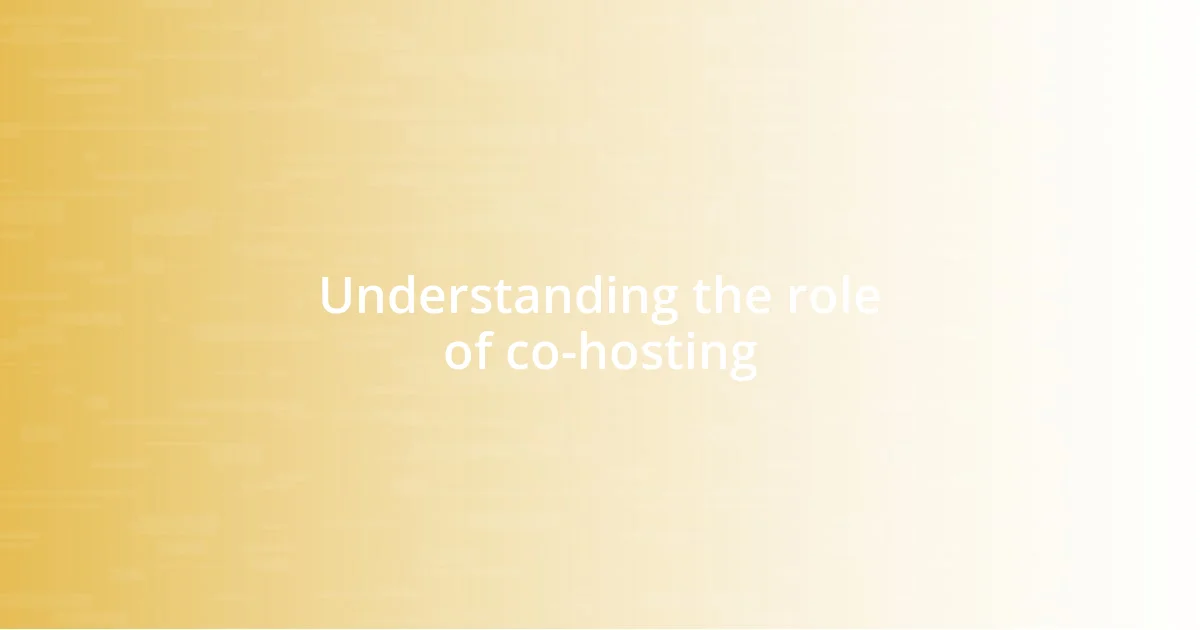
Understanding the role of co-hosting
Co-hosting is more than just sharing the responsibilities; it’s about creating a dynamic partnership that enhances the event’s overall experience. I remember my first time co-hosting a community fundraiser, where my co-host’s energy was contagious. We complemented each other’s strengths, which made the event flow seamlessly—what happens when you find that perfect synergy?
When I think about the role of a co-host, I realize that it often requires flexibility and adaptability. During one event, my co-host fell ill last minute, and I had to step up my game while managing the audience’s expectations. This taught me the importance of being prepared for the unexpected and how vital trust is in a co-hosting relationship—who wouldn’t want a partner they can rely on in crunch time?
Effective communication is key in co-hosting. After an event where we didn’t coordinate our speeches properly, I learned how vital it is to share ideas openly and plan the flow together. For me, it reinforced that behind every successful co-hosting experience is a partnership rooted in mutual respect and understanding—have you ever had to navigate a situation where communication made all the difference?
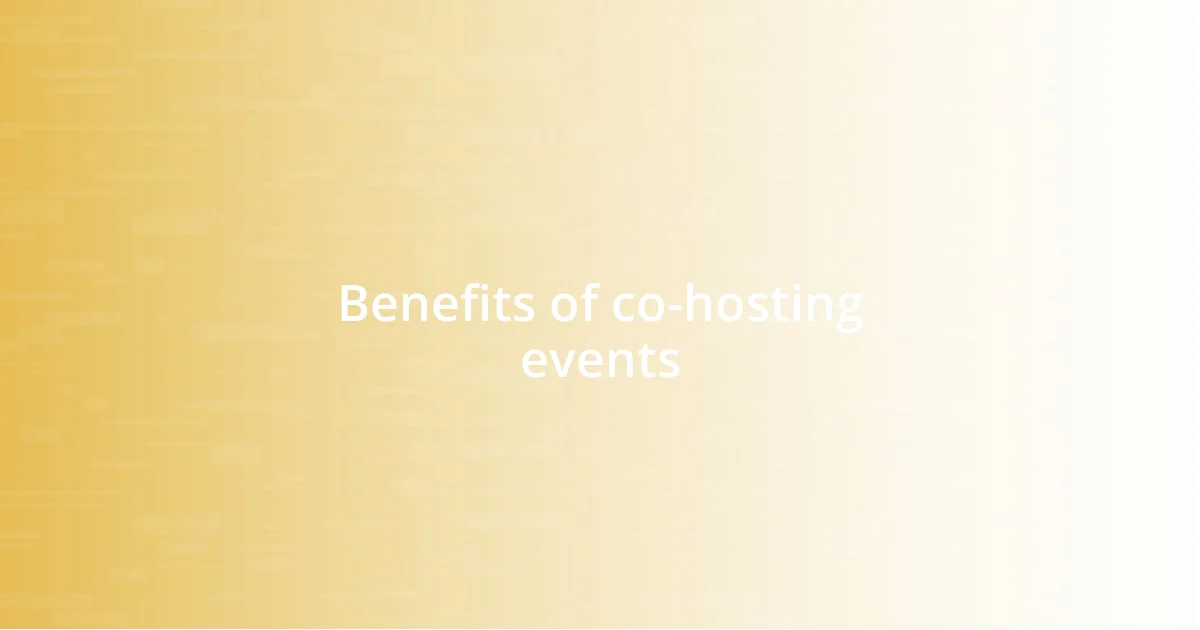
Benefits of co-hosting events
Co-hosting events significantly broadens your reach, allowing you to tap into each other’s networks. I vividly remember the time I teamed up with a well-connected colleague for a corporate networking event. Her connections not only doubled our attendees but also included influential figures that enriched our discussions. This shared audience isn’t just beneficial for numbers; it cultivates diverse interactions that invigorate the event’s atmosphere.
Working as co-hosts often means sharing the workload, which can lead to a smoother planning process. I’ve experienced the pressure of organizing events solo, and it can be overwhelming. When I co-hosted a charity gala, we divided tasks in a way that utilized our strengths. I managed logistics while my partner handled marketing, which made the preparation not only more efficient but also significantly less stressful. Together, we created a well-rounded experience that engaged our guests on multiple levels.
The collaborative aspect of co-hosting can lead to creative innovation. While preparing for a panel discussion, my co-host suggested activities that I wouldn’t have considered on my own. These fresh ideas breathed new life into the event, making it memorable for everyone involved. This synergy is a reminder that collaboration often sparks creativity that can elevate any event to new heights.
| Benefit | Description |
|---|---|
| Wider Reach | Tapping into each other’s networks increases attendance and engagement. |
| Shared Workload | Dividing responsibilities eases stress and leads to effective planning. |
| Creative Collaboration | Working together fosters innovative ideas that enhance the overall event. |
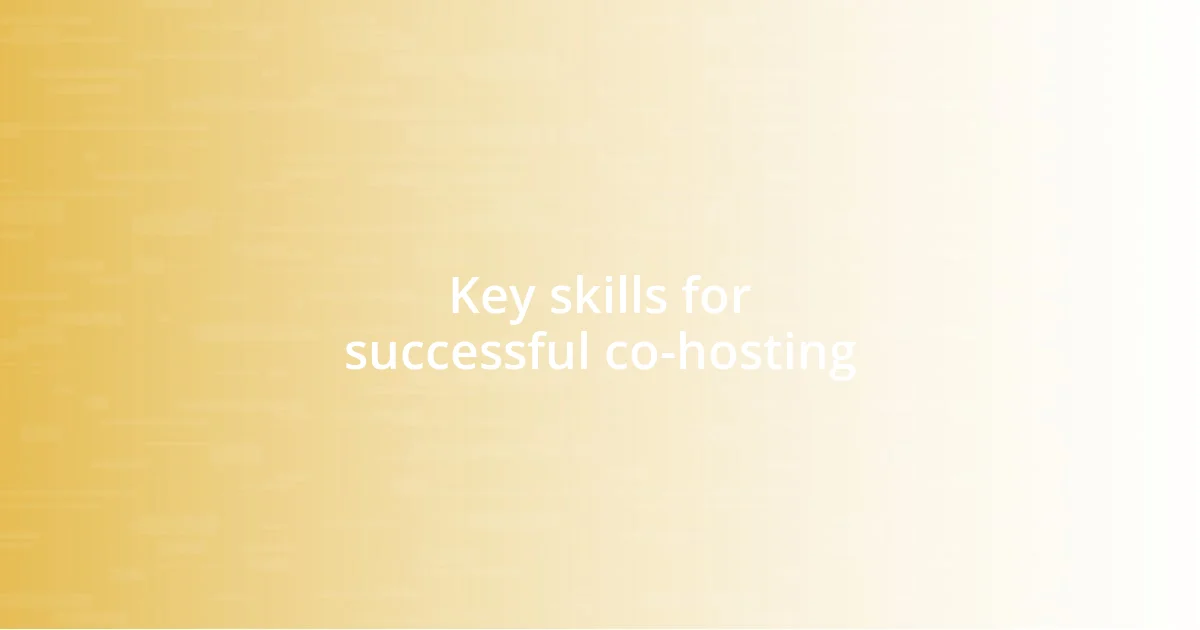
Key skills for successful co-hosting
When it comes to successful co-hosting, a blend of key skills can make all the difference. I’ve found that being adaptable is crucial. One time, at a last-minute tech event, my co-host and I had to completely shift our agenda due to a speaker cancellation. Instead of panicking, we collaborated and came up with an engaging Q&A session on the spot. That experience highlighted how essential it is to think on your feet, ensuring that the event remains dynamic and enjoyable for the audience.
Here are the key skills I believe every co-host should nurture:
- Effective Communication: Being open and honest about ideas fosters a productive partnership.
- Adaptability: Events can change in an instant; being flexible allows you to handle surprises smoothly.
- Conflict Resolution: Differences in opinions are natural; quickly finding common ground strengthens your teamwork.
- Strong Planning Skills: Detailed planning minimizes chaos and allows for a seamless flow throughout the event.
- Emotional Intelligence: Understanding each other’s strengths and weaknesses can create an environment of trust and cooperation.
- Networking Ability: Tapping into both of your networks expands the audience and enriches the event experience.
In my experience, these skills not only enhance the event but also build a stronger bond with your co-host. The memory of co-hosting a community event with someone I had only met recently still resonates with me; we quickly found our rhythm. This synergy not only created an enjoyable atmosphere but also deepened our professional relationship, proving how vital these skills are in making co-hosting fruitful.
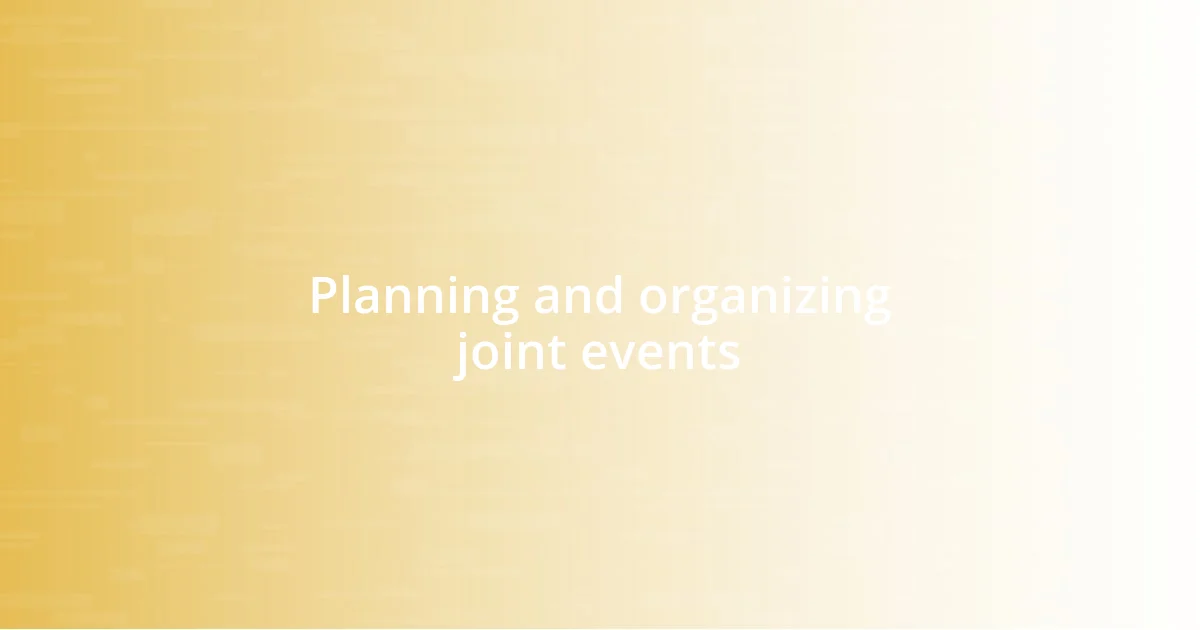
Planning and organizing joint events
Planning and organizing joint events can be an exhilarating experience when done right. I recall a time when my co-host and I mapped out our event using a shared digital workspace to keep everything organized. This not only allowed us to visually track tasks but also made it easy to communicate, as we could share files and notes in real-time. Have you ever had that moment when everything just clicks into place? That was our moment, and it set a positive tone for the entire planning process.
One key aspect I’ve learned about co-hosting is the importance of aligning visions early on. For instance, during a community festival we organized, my co-host and I spent a weekend brainstorming our goals and desired outcomes. It was eye-opening to realize how different our ideas initially were, yet we found common ground through open dialogue. This clear alignment gave us a solid foundation, helping to guide our decisions as we moved forward. It’s remarkable how such discussions can transform potential conflicts into opportunities for collaboration.
I’ve also found that flexibility during the planning stages is vital. During one event, we faced a venue change just a week before the big day, and my heart raced at the thought. Thankfully, we embraced the challenge together, quickly reworking our logistics and communicating with vendors. The way we rallied together not only turned a stressful situation around but also strengthened our teamwork. Have you ever faced a last-minute hiccup that tested your resolve? For me, it’s those moments that reveal the power of partnership in co-hosting.
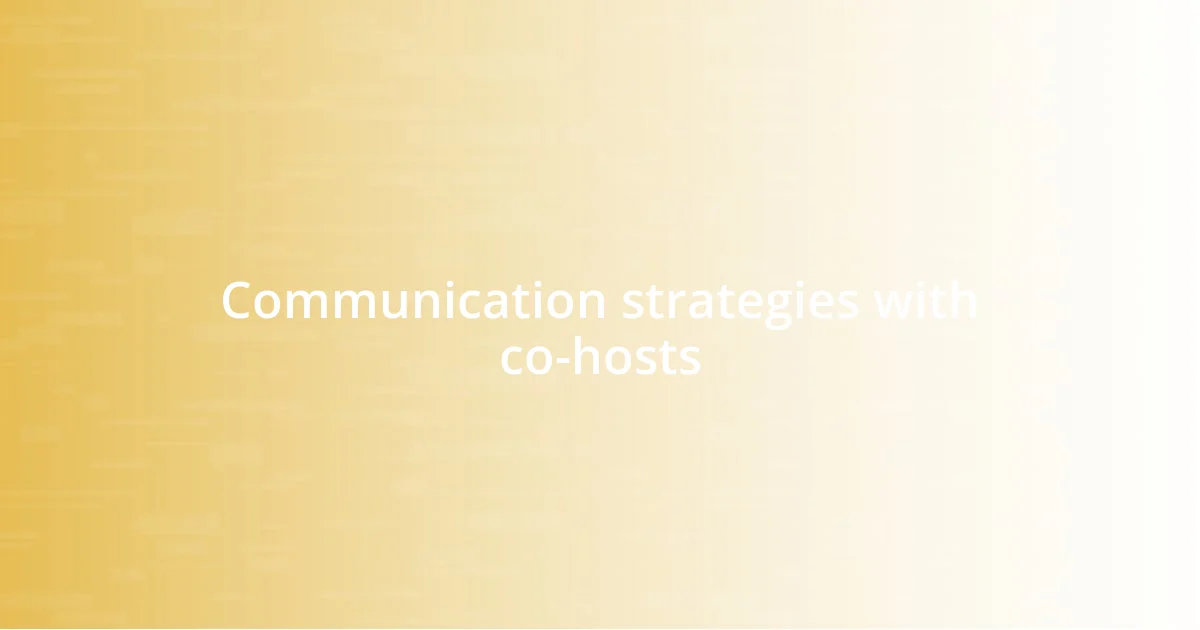
Communication strategies with co-hosts
Effective communication strategies with co-hosts are essential for a smooth event experience. I remember a time when I and my co-host decided to hold daily check-ins leading up to our event. These brief conversations provided a space to voice any concerns and brainstorm ideas together. It was refreshing to have that level of openness, allowing us to build trust and stay on the same page. Have you ever noticed how just a few minutes of dedicated dialogue can transform potential misunderstandings into shared enthusiasm?
Another key strategy I’ve adopted is utilizing different communication tools. During one of my events, we experimented with WhatsApp for quick updates and Google Docs for detailed planning. This combination allowed us to respond instantly while also keeping track of our overall objectives. I found that being able to communicate in real-time and still maintain organized documentation made a world of difference. It left us feeling connected and empowered throughout the planning process.
Listening goes hand in hand with communication. I once found myself in a tense situation when my co-host suggested an idea I was skeptical about. Instead of dismissing it outright, I made the conscious choice to listen and ask questions. That moment taught me the importance of valuing others’ perspectives, even when they initially clash with your own. It turned out his approach had merit, and our event ultimately benefited from our collaborative effort. How often do we let pride or uncertainty cloud our judgment? Embracing active listening has undoubtedly enriched my co-hosting experiences.
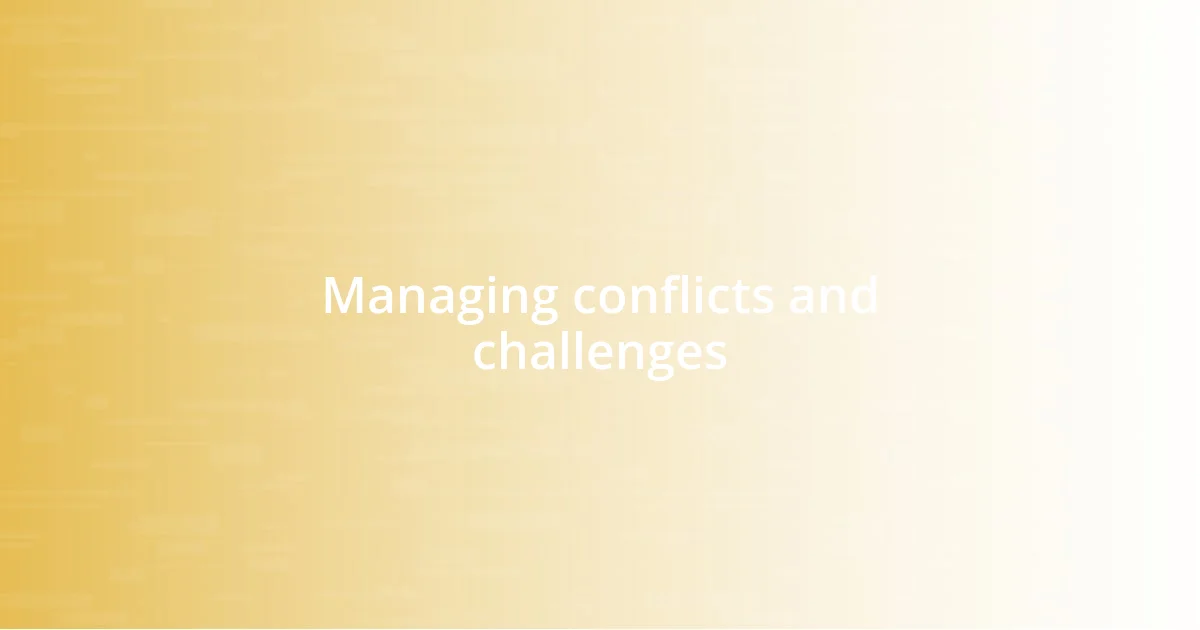
Managing conflicts and challenges
Managing conflicts and challenges is an inevitable part of co-hosting, and I’ve learned firsthand that a proactive approach is crucial. During one event, my co-host and I disagreed about a key element of the program. Instead of letting tension build, we stepped aside for a moment to have a candid discussion. It was surprising how a simple conversation could unearth underlying concerns, allowing us to pivot towards a solution that worked for both of us. Have you ever found that clear communication can diffuse a brewing storm?
In another instance, we faced conflicting schedules with our volunteer team, leading to overlapping responsibilities. It felt chaotic as deadlines loomed. However, we decided to host a quick, informal team meeting to clear the air. It was in that relaxed environment that everyone shared their concerns and ideas, transforming our initial frustration into cooperation. Isn’t it interesting how sometimes stepping back can open doors to collaboration?
I also believe in embracing challenges as growth opportunities. Once, when unexpected weather disrupted an outdoor event, we had to think on our feet. Instead of panicking, my co-host and I rallied the team to adjust our setup and quickly communicated changes to our guests. That experience taught me resilience; it’s a reminder that while we can’t control everything, we can certainly control how we respond. I’m curious, how do you handle those curveballs that come your way during planning?
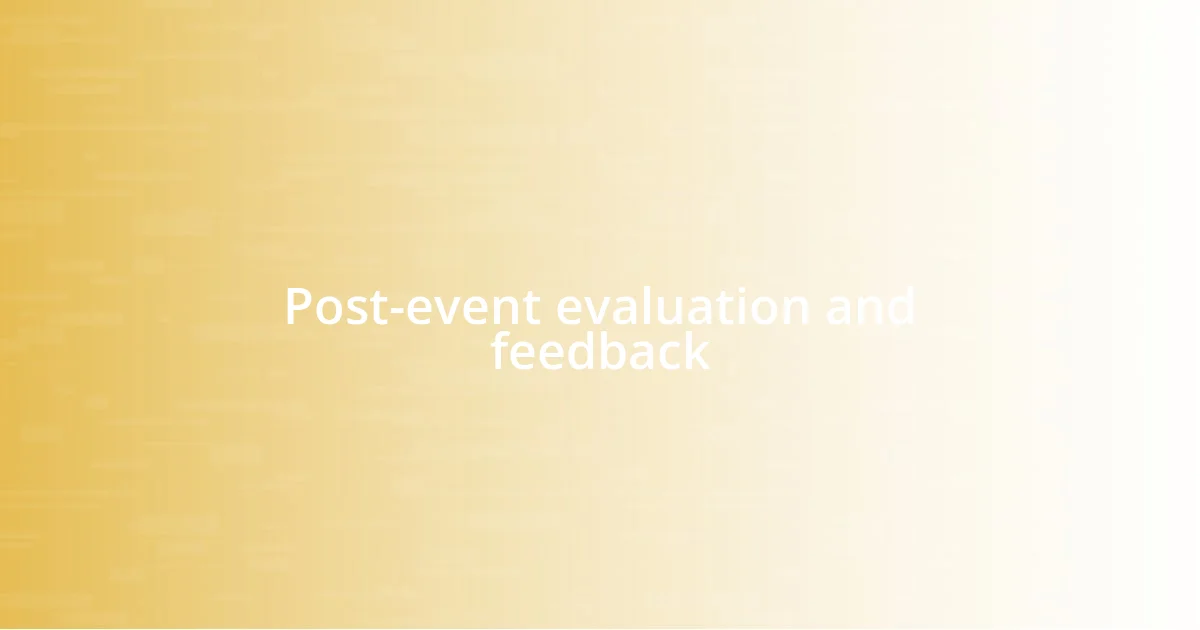
Post-event evaluation and feedback
Post-event evaluation is a crucial step that can often feel overlooked in the excitement of wrapping up an event. After one sizable gathering, my co-host and I sat down with our team to reflect on the experience. I remember feeling a mix of anxiousness and anticipation as we voiced what went well and where we could improve. This candid dialogue was invaluable—who knew that a simple debrief could spark so many innovative ideas for our next event?
Gathering feedback from attendees offers further layers of insight. At a recent workshop, I created a quick survey that attendees could fill out before leaving. I was pleasantly surprised by the thoughtfulness of their responses. It reinforced my belief that participants want to share their opinions, highlighting areas where we excelled and where improvements were needed. Isn’t it fascinating how these seemingly small snippets of feedback can shape future experiences?
Lastly, I learned that feedback isn’t solely about gathering data; it’s also about developing relationships. One time, an attendee expressed how much they appreciated our efforts directly to me. That simple interaction made the long hours of planning worthwhile. It reaffirmed my intent to keep the lines of communication open after events. How might you foster those connections to create lasting impressions?



